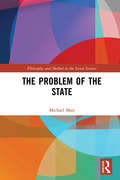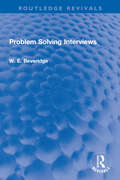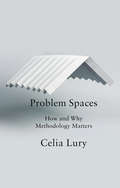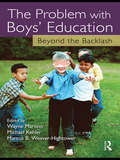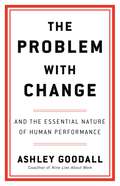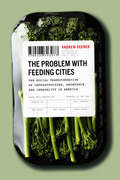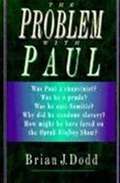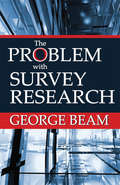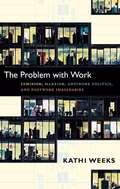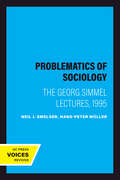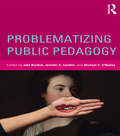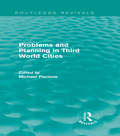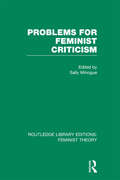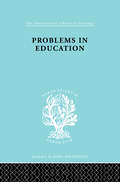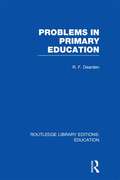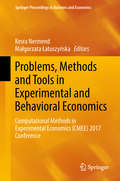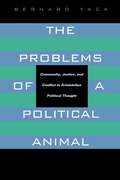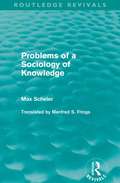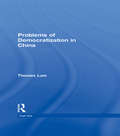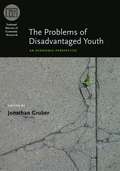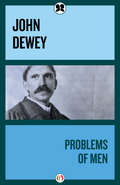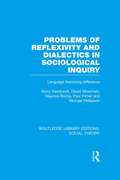- Table View
- List View
The Problem of the State (Philosophy and Method in the Social Sciences)
by Michael MairThe Problem of the State provides a new perspective on what the social and political sciences can contribute to understandings of the state and the ambivalent place it occupies in our collective affairs. Distinguishing two broad conceptual and methodological approaches to addressing the problem of how to study the state empirically rather than theoretically - the constitutionalist and constructionist positions – the author reviews the grounds and limits of both to reveal their common assumption: that it is up to the social and political sciences to define what the problem of the state is. Building on insights from Marx, Wittgenstein and Ethnomethodology, this book frees the study of the state from the limiting assumptions of common approaches and advocates a return of the problem to its proper environment, in social and political practice.
Problem Solving Interviews (Routledge Revivals)
by W. E. BeveridgeFirst published in 1968, Problem Solving Interviews explores different elements relating to conversations concerned with finding a solution to a particular problem. The book begins first by examining the role of the problem-solving interviewer, before exploring in detail what an interview is. It looks at the significance of different attitudes in shaping behaviour and highlights the importance of considering the attitudes of both the interviewer and the respondent. This leads on to a consideration of bias, including where it comes from, how it can affect the interview, and whether its impact can be eliminated or reduced. The book also covers carrying out and learning how to interview, and includes close analysis of three example interviews.
Problem Spaces: How and Why Methodology Matters
by Celia LuryIn this innovative book, Celia Lury argues that the time has come for us to explore the world not only with new methods, but with a new approach to methodology itself. Fundamental changes are taking place in how we produce knowledge, how we communicate it and, indeed, what we consider to be knowledge. These changes demand innovative and creative responses to research questions. Lury's rethinking of the nature of social inquiry starts by reconceptualizing the 'problem space'. Problems are not static or a 'given'; rather, they are created and continually recomposed as part of the methodological process itself. Following the line of thought that methods are practices that articulate as much as capture a social problem, Lury further develops the notion of compositional methodology to think through its implications. With remarkable fluency, the book draws into conversation a range of hot-button issues, both longstanding and novel, from observation, reflexivity, recursive measurement and feminist methodologies, to participation, context, datafication and platformization. Always with an eye to the methodological potential of new trends, the book provides a strong challenge to much received wisdom and argues that a combination of techniques can contribute to better understanding of the problem spaces we all inhabit.
The Problem with Boys' Education: Beyond the Backlash
by Wayne Martino Michael Kehler Marcus B. Weaver-HightowerThis book offers an illuminating analysis of the theories, politics, and realities of boys’ education around the world -- an insightful and often disturbing account of various educational systems’ successes and failings in fostering intellectual and social growth in male students. Examining original research on the impact of implementing boys’ education programs in schools, the book also discusses the role of male teachers in educating boys, strategies for aiding marginalized boys in the classroom, and the possibilities for gender reform in schools that begins at the level of pedagogy. Complete with case studies of various classrooms, school districts, and governmental policy programs, the detailed essays collected provide a look into education’s role in the development of masculinities, paying special attention to the ways in which these masculinities intersect with race, class, and sexuality to complicate the experience of boys within and outside of a classroom setting.
The Problem with Change: And the Essential Nature of Human Performance
by Ashley GoodallIf you&’ve had enough of the constant turbulence that defines corporate life today, you&’re not alone. Learn why change is bad for people and for business, and discover how to create the stability that we all need to thrive. For decades, &“disruption&” and &“change&” have been seen as essential to business growth and success. In this provocative and incisive book, leadership expert Ashley Goodall argues that what has become a sacred dogma is both wrong and harmful. Whether it&’s a merger or re-org or a new office layout, change has become the ultimate easy button for leaders, who pursue it with abandon, unleashing a torrent of disruption on employees. The result is what Goodall calls &“life in the blender&”—a perpetual cycle of upheaval, uncertainty, and unease. The problem with change, Goodall argues, is that a culture where everything from people to processes to strategic priorities are constantly in flux exerts a psychological toll that undermines motivation, productivity, and performance. And yet so accustomed are we to constant churn that we have become numb to its very real consequences. Drawing on two decades spent leading HR organizations at Deloitte and Cisco, Ashley Goodall reveals why change is not the same as improvement, and how, by prioritizing team cohesion (instead of reshuffling teams at will), by using real words (rather than corporate-speak), by sharing secrets (not mission statements), by fixing only the things that are truly broken (instead of moving fast and breaking everything in sight, and more, leaders at every level can create the stability that people need to thrive.
The Problem with Feeding Cities: The Social Transformation of Infrastructure, Abundance, and Inequality in America
by Andrew DeenerFor most people, grocery shopping is a mundane activity. Few stop to think about the massive, global infrastructure that makes it possible to buy Chilean grapes in a Philadelphia supermarket in the middle of winter. Yet every piece of food represents an interlocking system of agriculture, manufacturing, shipping, logistics, retailing, and nonprofits that controls what we eat—or don’t. The Problem with Feeding Cities is a sociological and historical examination of how this remarkable network of abundance and convenience came into being over the last century. It looks at how the US food system transformed from feeding communities to feeding the entire nation, and it reveals how a process that was once about fulfilling basic needs became focused on satisfying profit margins. It is also a story of how this system fails to feed people, especially in the creation of food deserts. Andrew Deener shows that problems with food access are the result of infrastructural failings stemming from how markets and cities were developed, how distribution systems were built, and how organizations coordinate the quality and movement of food. He profiles hundreds of people connected through the food chain, from farmers, wholesalers, and supermarket executives, to global shippers, logistics experts, and cold-storage operators, to food bank employees and public health advocates. It is a book that will change the way we see our grocery store trips and will encourage us all to rethink the way we eat in this country.
The Problem with Feeding Cities: The Social Transformation of Infrastructure, Abundance, and Inequality in America
by Andrew DeenerFor most people, grocery shopping is a mundane activity. Few stop to think about the massive, global infrastructure that makes it possible to buy Chilean grapes in a Philadelphia supermarket in the middle of winter. Yet every piece of food represents an interlocking system of agriculture, manufacturing, shipping, logistics, retailing, and nonprofits that controls what we eat—or don’t. The Problem with Feeding Cities is a sociological and historical examination of how this remarkable network of abundance and convenience came into being over the last century. It looks at how the US food system transformed from feeding communities to feeding the entire nation, and it reveals how a process that was once about fulfilling basic needs became focused on satisfying profit margins. It is also a story of how this system fails to feed people, especially in the creation of food deserts. Andrew Deener shows that problems with food access are the result of infrastructural failings stemming from how markets and cities were developed, how distribution systems were built, and how organizations coordinate the quality and movement of food. He profiles hundreds of people connected through the food chain, from farmers, wholesalers, and supermarket executives, to global shippers, logistics experts, and cold-storage operators, to food bank employees and public health advocates. It is a book that will change the way we see our grocery store trips and will encourage us all to rethink the way we eat in this country.
The Problem with Feeding Cities: The Social Transformation of Infrastructure, Abundance, and Inequality in America
by Andrew DeenerFor most people, grocery shopping is a mundane activity. Few stop to think about the massive, global infrastructure that makes it possible to buy Chilean grapes in a Philadelphia supermarket in the middle of winter. Yet every piece of food represents an interlocking system of agriculture, manufacturing, shipping, logistics, retailing, and nonprofits that controls what we eat—or don’t. The Problem with Feeding Cities is a sociological and historical examination of how this remarkable network of abundance and convenience came into being over the last century. It looks at how the US food system transformed from feeding communities to feeding the entire nation, and it reveals how a process that was once about fulfilling basic needs became focused on satisfying profit margins. It is also a story of how this system fails to feed people, especially in the creation of food deserts. Andrew Deener shows that problems with food access are the result of infrastructural failings stemming from how markets and cities were developed, how distribution systems were built, and how organizations coordinate the quality and movement of food. He profiles hundreds of people connected through the food chain, from farmers, wholesalers, and supermarket executives, to global shippers, logistics experts, and cold-storage operators, to food bank employees and public health advocates. It is a book that will change the way we see our grocery store trips and will encourage us all to rethink the way we eat in this country.
The Problem with Paul
by Brian J. DoddWas Paul a chauvinist? Was he a prude? Was he anti-Semitic? Why did Paul condone slavery? How might he have fared on the Oprah Winfrey Show? People outside the church have often found Paul hard to stomach. His views on women, sex and marriage, his failure to attack the institution of slavery, and his verbal attacks on his opponents have all come under fire. Regrettably, Paul hasn't always fared that much better among believers. Like the apostle Peter, many wonder what to make of Paul and his confusing, controversial--and sometimes apparently contradictory--teachings. To put it simply, Paul just isn't politically correct. Brian Dodd offers a fresh look at the perpetually enigmatic and misunderstood Paul. Combining pastoral insight and scholarly rigor, he helps us bridge the gap between Paul's ancient world and our postmodern setting. Here is much-needed perspective for making sense of Paul--the man and his message.
The Problem with Survey Research
by George BeamThe Problem with Survey Research makes a case against survey research as a primary source of reliable information. George Beam argues that all survey research instruments, all types of asking-including polls, face-to-face interviews, and focus groups-produce unreliable and potentially inaccurate results. Because those who rely on survey research only see answers to questions, it is impossible for them, or anyone else, to evaluate the results. They cannot know if the answers correspond to respondents' actual behaviors (objective phenomena) or to their true beliefs and opinions (subjective phenomena). Reliable information can only be acquired by observation, experimentation, multiple sources of data, formal model building and testing, document analysis, and comparison. In fifteen chapters divided into six parts-Ubiquity of Survey Research, The Problem, Asking Instruments, Asking Settings, Askers, and Proper Methods and Research Designs-The Problem with Survey Research demonstrates how asking instruments, settings in which asking and answering take place, and survey researchers themselves skew results and thereby make answers unreliable. The last two chapters and appendices examine observation, other methods of data collection and research designs that may produce accurate or correct information, and shows how reliance on survey research can be overcome, and must be.
The Problem with Work: Feminism, Marxism, Antiwork Politics, and Postwork Imaginaries
by Kathi WeeksIn The Problem with Work, Kathi Weeks boldly challenges the presupposition that work, or waged labor, is inherently a social and political good. While progressive political movements, including the Marxist and feminist movements, have fought for equal pay, better work conditions, and the recognition of unpaid work as a valued form of labor, even they have tended to accept work as a naturalized or inevitable activity. Weeks argues that in taking work as a given, we have "depoliticized" it, or removed it from the realm of political critique. Employment is now largely privatized, and work-based activism in the United States has atrophied. We have accepted waged work as the primary mechanism for income distribution, as an ethical obligation, and as a means of defining ourselves and others as social and political subjects. Taking up Marxist and feminist critiques, Weeks proposes a postwork society that would allow people to be productive and creative rather than relentlessly bound to the employment relation. Work, she contends, is a legitimate, even crucial, subject for political theory.
Problematics of Sociology: The Georg Simmel Lectures, 1995
by Neil J. SmelserThese skillfully written essays are based on the Georg Simmel Lectures delivered by Neil J. Smelser at Humboldt University in Berlin in the spring of 1995. A distillation of Smelser's reflections after nearly four decades of research, teaching, and thought in the field of sociology, the essays identify, as he says in the first chapter, ". . . some central problematics—those generic, recurrent, never resolved and never completely resolvable issues—that shape the work of the sociologist."Each chapter considers a different level of sociological analysis: micro (the person and personal interaction), meso (groups, organizations, movements), macro (societies), and global (multi-societal). Within this framework, Smelser covers a variety of topics, including the place of the rational and the nonrational in social action and in social science theory; the changing character of group attachments in post-industrial society; the eclipse of social class; and the decline of the nation-state as a focus of solidarity.The clarity of Smelser's writing makes this a book that will be welcomed throughout the field of social science as well as by anyone wishing to understand sociology's essential characteristics and problems.
Problematizing Public Pedagogy
by Jennifer A. Sandlin Jake Burdick Michael P. O’MalleyThe term ‘public pedagogy’ is given a variety of definitions and meanings by those who employ it. It is often used without adequately explicating its meaning, its context, or its location within differing and contested articulations of the construct. Problematizing Public Pedagogy brings together renowned and emerging scholars in the field of education to provide a theoretical, methodological, ethical, and practical ground from which other scholars and activists can explore these forms of education. At the same time it increases the viability of the concept of public pedagogy itself. Beyond adding a multifaceted set of critical lenses to the genre of public pedagogy inquiry and theorizing, this volume adds nuance to the broader field of education research overall.
Problems and Planning in Third World Cities (Routledge Revivals)
by Michael PacioneWhen this title was first published in 1981, growing concern for the future of cities and those who inhabited them, stimulated by trends in global urbanisation, had resulted in much emphasis being placed on a problem-solving approach to the study of the city. The chapters in this edited collection, a companion to Urban Problems and Planning in the Developed World (Routledge Revivals, 2013), consider the problems and planning activities in a number of cities across the world. Varied case-studies, including Mexico City, Bogota and Shanghai, reflect the differing economic, cultural and political regimes of the modern world and ensure the continued value of this comprehensive work.
Problems for Feminist Criticism (Routledge Library Editions: Feminist Theory)
by Sally MinogueFeminist criticism has come a long way in the last twenty years. Its development has been rapid, its snowball progress picking up elements of structuralism, deconstruction and psychoanalytic criticism; just as rapidly it has been shedding its own early theories and methodologies. Now it is a critical orthodoxy with its own established canonical texts. Now is the time, then, to begin to question that orthodoxy. In Problems for Feminist Criticism five women critics seek to do that, in a spirit of enquiry whose central point of focus is the literature for which feminist critics have offered a re-reading. By reference to a wide range of writers, from Milton to the contemporary poet, with a strong emphasis on the nineteenth-century novel, the contributors ask what we may be losing from literature by adopting the feminist orthodoxy. Each chapter provides a survey of feminist critical approaches to its subject and highlights the inherent problems. The book frees the way forward for critics who have found much that is stimulating and revealing in feminist approaches to literature, but who find its proscriptiveness potentially reductive. It shows how literature may have the flexibility to absorb and benefit from new critical approaches, whilst still retaining its own life, never quite to be contained in criticism’s theories and methodologies.
Problems In Education Ils 232 (International Library of Sociology)
by Brian HolmesFirst published in 1998. Routledge is an imprint of Taylor & Francis, an informa company.
Problems in Primary Education (Routledge Library Editions: Education)
by R F DeardenThe first part of the book discusses aims, who should determine them and how they might be determined. The second part discusses some more specific topics of learning and teaching, such as learning how to learn, the integrated day and the use of competition. The author distinguishes three broad levels of thought in looking at schools: the details of choice and decision; the general principles which are, or ought to be, guiding that detailed practice; and the theoretical commentaries on the guiding principles available from the various disciplines which constitute the study of education.
Problems, Methods and Tools in Experimental and Behavioral Economics: Computational Methods in Experimental Economics (CMEE) 2017 Conference (Springer Proceedings in Business and Economics)
by Kesra Nermend Małgorzata ŁatuszyńskaThese proceedings highlight research on the latest trends and methods in experimental and behavioral economics. Featuring contributions presented at the 2017 Computational Methods in Experimental Economics (CMEE) conference, which was held in Lublin, Poland, it merges findings from various domains to present deep insights into topics such as game theory, decision theory, cognitive neuroscience and artificial intelligence. The fields of experimental economics and behavioral economics are rapidly evolving. Modern applications of experimental economics require the integration of know-how from disciplines including economics, computer science, psychology and neuroscience. The use of computer technology enhances researchers’ ability to generate and analyze large amounts of data, allowing them to use non-standard methods of data logging for experiments such as cognitive neuronal methods. Experiments are currently being conducted with software that, on the one hand, provides interaction with the people involved in experiments, and on the other helps to accurately record their responses. The goal of the CMEE conference and the papers presented here is to provide the scientific community with essential research on and applications of computer methods in experimental economics. Combining theories, methods and regional case studies, the book offers a valuable resource for all researchers, scholars and policymakers in the areas of experimental and behavioral economics.
The Problems of a Political Animal: Community, Justice, and Conflict in Aristotelian Political Thought
by Bernard YackA bold new interpretation of Aristotelian thought is central to Bernard Yack's provocative new book. He shows that for Aristotle, community is a conflict-ridden fact of everyday life, as well as an ideal of social harmony and integration. From political justice and the rule of law to class struggle and moral conflict, Yack maintains that Aristotle intended to explain the conditions of everyday political life, not just, as most commentators assume, to represent the hypothetical achievements of an idealistic "best regime."By showing how Aristotelian ideas can provide new insight into our own political life, Yack makes a valuable contribution to contemporary discourse and debate. His work will excite interest among a wide range of social, moral, and political theorists.
Problems of a Sociology of Knowledge (Routledge Revivals)
by Max SchelerFirst Published in 1980, Manfred S. Frings’ translation of Problems of a Sociology of Knowledge makes available Max Scheler’s important work in sociological theory to the English-speaking world. The book presents the thinker’s views on man’s condition in the twentieth-century and places it in a broader context of human history. This book highlights Scheler as a visionary thinker of great intellectual strength who defied the pessimism that many of his peers could not avoid. He comments on the isolated, fragmented nature of man’s existence in society in the twentieth century but suggests that a ‘World-Age of Adjustment’ is on the brink of existence. Scheler argues that the approaching era is a time for the disjointed society of the twentieth-century to heal its fractures and a time for different forms of human knowledge to come together in global understanding.
Problems of Democratization in China (East Asia)
by Thomas G. LumFirst published in 2000. Routledge is an imprint of Taylor & Francis, an informa company.
The Problems of Disadvantaged Youth: An Economic Perspective
by Jonathan GruberOne of the most important public policy issues in the United States is how to improve the life prospects of disadvantaged youth who, in their formative years, face low-quality school systems, poor access to health care, and high-crime environments. The Problems of Disadvantaged Youth includes a broad range of research examining various aspects of disadvantage, and ways of increasing the ability of low-income youths to improve their circumstances later in life. Taking an empirical economics perspective, the nine essays in this volume assess the causal impacts of disadvantage on youth outcomes, and how policy interventions can alleviate those impacts. Each chapter develops a framework to describe the relationship between youths and later life outcomes, addressing such factors as educational opportunity, health, neighborhood crime rates, and employment. This vital book documents the serious short- and long-term negative consequences of childhood disadvantage and provides nuanced evidence of the impact of public policy designed to help needy children.
Problems of Life
by Leon Trotsky Lev D. Trotsky Z. VengerovaFrom the introduction: Trotsky's great merit is the exceptionally wide scope of his vision. He unites the destructive elements of a revolutionary mind with the zeal of a master-builder intent on constructive work. The world knows him as one of the implacable Bolshevist leaders, but Problems of Life, a book published only a few months ago in Russian, shows Trotsky in a very different light. It shows that in the middle of his military and militant activities he devotes much of his energy to the peaceful work of social reconstruction, and that the centre of the problem lies for him in culture, education and morals. His book deals with the interests, duties and morals of daily life, and shows Bolshevism and the Bolshevist spirit from a new constructive side.
Problems of Men
by John DeweyAlthough primarily addressed to the general reader, the introduction and the last chapters of this work strike straight at reactionary philosophers who obstruct the philosophers who are honest searchers for wisdom.
Problems of Reflexivity and Dialectics in Sociological Inquiry: Language Theorizing Difference (Routledge Library Editions: Social Theory)
by Barry Sandywell David Silverman Maurice Roche Paul Filmer Michael PhillipsonThis is a work of social theory and philosophy which seeks to make the constitution of social theory a ‘social’ activity. It is essentially a collaborative text, by five authors, committed to a re-awakening of some of the forgotten dimensions of social theorizing. The collaborative work was originally occasioned by an attempt to analyse the notion of social stratification and its treatment in the sociological tradition. The authors’ main concern here is with the nature of social theorizing, and in particular the ‘difference’ between Self and Other, being and beings, Language and Speech. The papers in the book focus on themes that are fundamental to the sense of inquiry and tradition which they are concerned to display. The themes discussed include speech, Language, Identity, Difference, Critical Tradition, Community, Metaphor, Dialectics, Observing and Reading.
